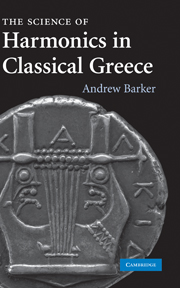Postscript: the later centuries
Published online by Cambridge University Press: 22 September 2009
Summary
Harmonic theory is mentioned by various writers of the period between about 300 bc and the beginning of the Christian era, most of them (Philodemus, Vitruvius and Dionysius of Halicarnassus, for example) in its latter years, but nothing they say suggests that original works in the discipline were still being produced. The fact probably reflects more than an accidental gap in our evidence; there is little to encourage the thought that harmonics continued to flourish during those centuries in the hands of theorists whose writings have been lost. The authors of treatises from the Roman imperial period refer quite often to their predecessors; but some of those they mention are their own near-contemporaries, and nearly all the others belong to the fifth or fourth centuries bc, almost none to the third, second or first. The later theorists seem to have thought of themselves, in fact, as the immediate successors of Philolaus, Archytas, Plato, Aristoxenus and ‘Euclid’, as if the intervening generations had said nothing at all on the subject, or at any rate nothing interesting and new.
Writings devoted wholly or in large part to harmonics reappear early in the first century ad, and continue, if not in a torrent then at least in a steady trickle, right down to Boethius in the early sixth. Through Boethius' Latin reformulation, a version of Greek mathematical harmonic theory passed into the medieval tradition.
- Type
- Chapter
- Information
- The Science of Harmonics in Classical Greece , pp. 437 - 449Publisher: Cambridge University PressPrint publication year: 2007



